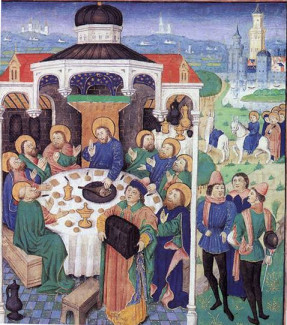The interaction of Jesus with a known tax collector, one of the most abhorred people in Jewish society, can teach us valuable lessons about the Lord's character and the meaning of true repentance.
Visiting Jericho
The Jericho visited by Jesus was a border town lying just west of the Jordan River. As the second wealthiest city in Palestine (next to Jerusalem), it was a major generator of Roman tax income. As such, the Empire was keen to employ a local Jewish collector like Zaccheus to insure a steady stream of revenue. Most of the money collected was in customs, as the city was situated along a major trade route running from Egypt to lands east of the Jordan River.
Zaccheus (whose name, ironically, means "just" or "pure") the tax collector was a short (possibly less than five feet or 1.5 meters tall) but quite wealthy and well known person in Jericho. He was the city's chief gatherer of customs fees and likely employed others as well.
Then Jesus entered Jericho and was passing through. And behold, a man named Zaccheus was there. Now he was a chief tax collector, and he was rich. (Luke 19:1 - 2, HBFV throughout).

As Jesus and most people were well aware, the great riches possessed by people who gathered taxes for Rome was achieved through extortion and theft.
Now the tax collectors also came to be baptized (by John the Baptist), and they said to him, "Master, what shall we do?" And he said to them, "Exact nothing beyond that which is appointed to you." (Luke 3:12 - 13, see also 19:7 - 8).
It is therefore not unusual, given the sinful ways by which their carried out their responsibilities, that tax collectors were some of the most despised people in the New Testament (see Luke 18:11). Jesus even used them, in his Sermon on the Mount, as an example of those who severely lacked love and concern for other people.
For if you love those who love you, what reward do you have? Do not the tax collectors practice the same thing?
And if you salute your brethren only, what have you done that is extraordinary? Do not the tax collectors practice the same thing? (Matthew 5:46 - 47).
The Encounter
Zaccheus, as Jesus travels through the city, is unable to see him through the large crowd that congregates near the street. Determined to see the Lord at all costs, he runs ahead of the crowd and climbs up a sycamore tree.
As Jesus passes under the sycamore he surprises Zaccheus by not only calling him by name but also declaring he will be staying at his house! The announcement brings joy to the notorious collector of taxes but derision from the crowd.
But after running ahead, in front of the multitude, he (Zaccheus) climbed up into a sycamore tree so that he might see Him; for He was about to pass that way.
And when He came to the place, Jesus looked up and saw him, and said to him, "Zaccheus, make haste to come down, for today it is necessary for Me to stay at your house."
And he came down in haste and received Him joyfully. But after seeing this, everyone began to criticize, saying, "He has gone in to lodge with a sinful man." (Luke 19:4 - 7).
Zaccheus responds to Christ's merciful offer to spend time with him by publicly declaring he will give half of his vast wealth to the poor. He also promises to return his ill-gotten riches fourfold to those he cheated (Luke 19:8)!
Jesus then declares that salvation has come to him and that reaching out to those who are "lost" is one of the primary goals of his ministry.
And Jesus said to him, "Today, salvation has come to this house . . . For the Son of man has come to seek and to save that which is lost" (Luke 19:9 - 10).
What Did We Learn?
The encounter Jesus had with Zaccheus the tax collector shows his willingness to interact with even the most despised and hated members of society despite what others think (Matthew 9:10 - 11, 11:19, Luke 5:29 - 30). His compassion and mercy towards sinners is something all Christians need to emulate.
Diligence and perseverance matter to God! Zaccheus was determined to see Jesus and his efforts were rewarded beyond what he expected. Our willingness to pursue, steadfastly, what is right can make all the difference in the world (see Luke 18:1 - 8).
While it is difficult for a rich man to enter God's Kingdom, it is not impossible. The mercy Jesus extended toward Jericho's chief tax collector (and thief) shows that even the most hated person could change and turn their lives around.
Repentance, if it is genuine, must be followed by tangible acts that show a willingness to change one's life and obey God.
Unlike the rich young man who was unwilling to part with his wealth (Matthew 19:16 - 26), Zaccheus the tax collector "put his money where his mouth was" and pledged to use his riches for righteous goals.